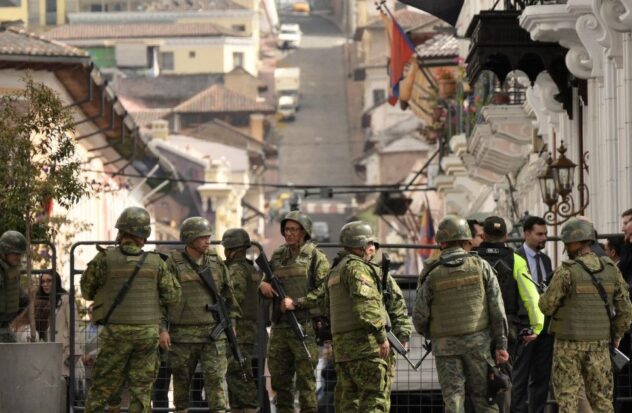The fierce wave of violence, unleashed by drug trafficking mafias, led to the President Daniel Noboa to decree a state of emergency in five Ecuadorian provinces on May 1, days after the nationwide measure implemented since the beginning of January ended, when it declared a “state of war” to combat these organizations “narcoterrorists”.
Once the most peaceful nation in the region It closed 2023 being the most violent country in Latin Americawith 40 violent deaths per 100,000 inhabitants, a figure that they estimate will rise to 42 by the end of this year.
Although Ecuador has been going through an insecurity crisis for several years, it was not until 2023 that it reached its peak, following the decision of the former president. Guillermo Lasso (2021 – 2023)who shortened his presidential term to avoid impeachment, to “attack the problem of drug trafficking head-on.”
“Apparently a tacit agreement was brokenor that it would have existed with organized crime structures so that the State would not persecute them with such force, in exchange for having quiet streets and not having so much street violence,” he explains in an interview with DIARIO LAS AMERICAS the expert in Intelligence and security, Lorena Piedra, president of the Association of International Studies of Ecuador.
This “line” that existed with certain criminal organizations was crossed with the “frontal” attack on drug trafficking, by increasing drug seizures that reduced the income of these structures, causing them “significant economic effects”continues Piedra.
He points out that gangs like Los Lobos, linked to the Mexican cartel Jalisco Nueva Generación, whose leader, Fabricio Colón Pico, was recaptured on April 22, have “thousands of members” throughout Ecuador who live off the income from illicit economies, with charges from 70 to 500 dollars per “job”.
“These criminal gangs have chosen to change the direction of the business towards other, more domestic issues to finance themselves, and that is what has characterized the increase in extortion kidnappings and some hitmen, because now they have boys as young as 12 capable of committing a crime. crime of these and the price of a death on demand has dropped a lot,” he says.
Drug trafficking, an open secret
An open secret was revealed last December, as a result of the “Metastasis” investigation which, according to statements by the Ecuadorian attorney general, Diana Salazar, evidenced the establishment of “narcopolitics” in Ecuador.
Due to this investigation, which arose as a result of the murder in prison of the drug trafficker Leandro Norero, alias “El Patron”, in October 2022, more than 50 judicial and penitentiary officials, prosecutors, police officers and politicians, who had received money from the drug trafficking.
Luis Córdova Alarcón, director of the Order, Conflict and Violence research program at the Central University of Ecuador (UCE), explains that although the first cases of narcopolitics in the South American nation occurred during the government of former president León Febrés-Cordero (1984 – 1988), the particular thing currently is that has “absolutely” permeated the political system Ecuadorian.
“In Ecuador what happened in Colombia is being reproduced or what has happened in other countries where there are very profitable illicit economies that permeate politics. What is different is that now, apparently, this is absolutely permeated into the political system, which weakens the State’s ability to react,” he says in conversation with DIARIO LAS AMERICAS.
The decision of former President Rafael Correa (2007 – 2017) to expel the Manta Base in 2009, which allowed drug trafficking to be monitored on the Ecuadorian coast and in much of the region, marked a milestone in the fight against drug trafficking in Ecuador. which went from being a drug transit country to a distribution center.
“With the FARC (Colombian guerrilla) financing Rafael Correa’s campaign, you could not be certain that his decisions or implementation of public policies were not consistent with whoever financed his campaign. It would be quite naive to consider that this was an exclusively sovereign position from Ecuador,” says analyst Lorena Piedra.
Death threats and hitmen
The relentless criminal onslaught in Ecuador has claimed the lives of a series of political leaders, including the presidential candidate Fernando Villavicencio; the mayor of Manta, Agustín Intriago; prosecutor César Suárez, who was investigating an armed attack on a television channel in January; and, more recently, the mayor of San Vicente, Brigette García, and the mayors of Portovelo and Camilo Ponce Enríquez, Jorge Maldonado and José Sánchez Reyes, respectively.
Villavicencia, a favorite in the polls, was a staunch opponent of Correismo and had for years denounced corruption in the Andean nation, and the penetration of drug trafficking, mainly by Mexican cartels, in Ecuadorian politics.
However, his hitman, which shocked the world, was not the first product of drug trafficking reprisals. “The mayor of Manta, who was assassinated a month before Villavicencio, had business with Norero”, Stone mentions. Intriago, who appears in the chats that give rise to the “Metástasis” case, would have acted as a facilitator of contracts for money legitimization companies. “Apparently he became bad with business and that’s why they killed him,” he adds.
This case, which has shaken Ecuadorian politics, has provoked a series of death threats to authorities, including the attorney general, and collaborators, Mayra Salazar and Helive Ángulowhose testimonies have been fundamental in clarifying this network of narco-corruption.
The shooting murder on April 28 of former Miss Landy Párraga, romantically linked to Norero and whose name appeared in a money laundering investigation, could also be linked to the “Metastasis” case. “She would have laid out a path that allowed money to be laundered through a company and that there were issues there that were not convenient for many to come to light,” Piedra mentions.
The threats, added to the hitmen of those involved in the investigation, would have the purpose of silencing the voices to stop the progress of the case. “We are going to have death threats and deaths which are a consequence of businesses, criminal and illicit connections not coming to light. This is how organized crime structures work, if someone constitutes a problem for the business, they are just eliminated, they are murdered,” he points out.
Insufficient policies
Analysts consider that President Noboa’s policies are “hot water cloths” to stop the wave of violence, despite the support it received in the popular consultation on April 21. “The decisions that the government has made are insufficient and ineffective to contain a phenomenon that has nothing to do with the military presence,” says researcher Luis Córdova Alarcón.
They agree that the only approved measures that make a difference are the extradition of criminals, the confiscation of assets and the presence of soldiers on the streets. Furthermore, they estimate that the Nayib Bukele-style “iron fist” policy in El Salvador has worked from a communication point of view, but not from a “real practical” point of view.
“It is not feasible (a Bukele model) in the Ecuadorian case because it is not the territorial extension of El Salvador and, in legal terms, would imply that the president breaks all de facto guarantees. Furthermore, the phenomenon of organized crime in Ecuador is not similar to gangs, they have other connotations and that means that it will not be feasible to identify them as they have done in El Salvador,” highlights Córdova Alarcón.
Piedra points out that while the public debate focused on what appears on social networks such as “effective measures”, but that “do not solve the problem structurally”, the situation is going to worsen. Therefore, he urges the authorities to establish structural measures, beyond the “safety makeup”that can be “really effective.”
“There are no conditions that allow you to reproduce your life in safe or normal conditions. Ecuador continues to expel migration, based on security issues, impacts on GDP and work. As long as the issue of work and economic growth is not resolved, the issue of security will not be resolved.”, he points out.
The spiral of violence, according to Córdova Alarcón, is going to worsen as long as the government continues to apply “the same recipe,” with states of exception, to the phenomenon of drug trafficking.
In his opinion, the president should distance himself from the war on drugs and replace it with “a war against guns”, with a weapons control policy that restricts imports, regulates the acquisition and limits the carrying of weapons. “The central problem is that in a country where there is a huge arms market, it is obvious that they are going to be used to kill,” emphasizes the researcher.


